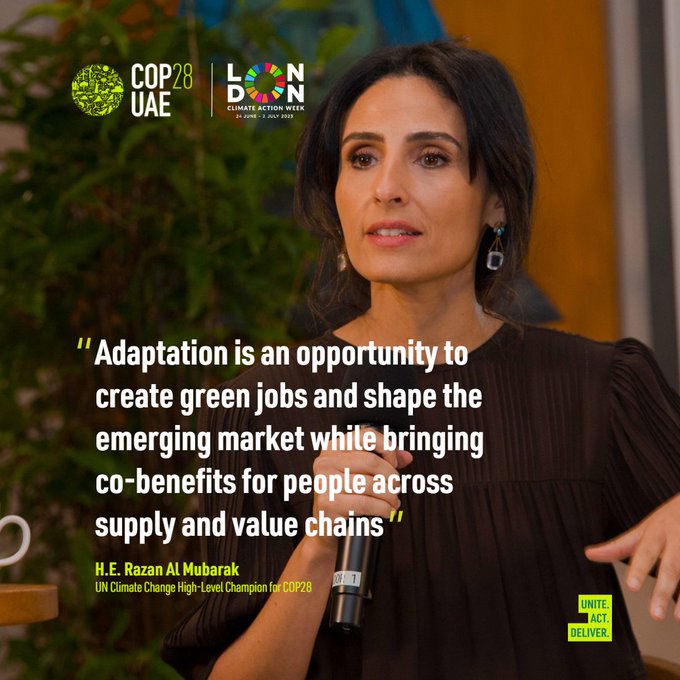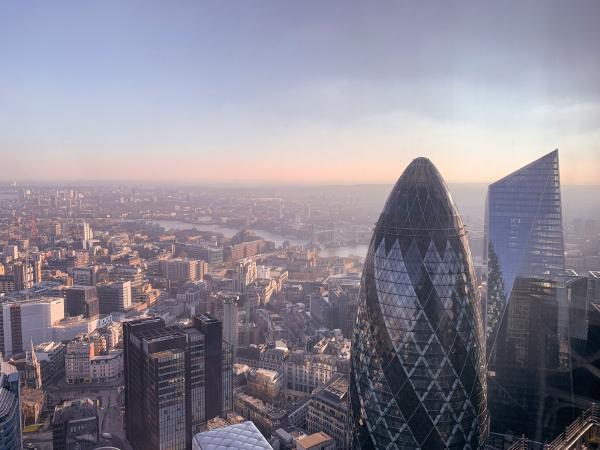By Theo Bachrach, Campaign Manager, Resilience Rising
Alongside the clear role of business in supporting a transition to zero emission economies, London Climate Action Week showed how business can play a leading role in the transition to resilient livelihoods and systems so people and nature can thrive, not just survive, in the face of climate change.
As if to underscore the theme of our Roundtable discussion during London Climate Action Week , “Accelerating Private Sector Leadership on Climate Resilience – making the business case”, less than a week on the world experienced its hottest day since records began.
The data is clear: alongside a rapid transition to zero emission economies, we also need to raise the level of ambition – and action – from the private sector on building the resilience of people and nature to the impacts of climate change. Where you live or do business does not matter - the cascading impacts of climate change will continue to disrupt supply chains and the ability of businesses to operate globally.
Feike Sijbesma, Former CEO Royal DSM, Chairman Royal Philips, Co chair Global Climate Adaptation Centers, commented: "Climate change will impact the lives of many people, especially the most vulnerable. Therefore we must act on climate adaptation next to our continued effort on mitigation. Via climate adaptation actions we can make our food and water provision more resilient, as well as protect our cities and infrastructure. The private sector needs to step up, in order to make their own supply chains and operations more resilient, and using their innovative solutions to help countries".
The good news is that the private sector is already waking up to the role it can play in building resilience and we are starting to see examples of leadership and collaboration to learn from and scale private sector action.
Progress on mainstreaming resilience
Since its launch at COP26, the Race to Resilience has been campaigning to accelerate business inclusion in resilience building efforts, and we continue to see more businesses embedding adaptation and resilience into corporate strategies. A poll of the full house of senior business representatives showed that 67% of businesses have identified material risks from the impacts of climate change with 69% having placed adaptation into their corporate strategies.
This increasing awareness is supported by ongoing development and evolution of business specific frameworks and systemic approaches to adaptation and resilience which are creating private sector applicable action pathways for climate resilience action.
The mainstreaming of resilience is further accelerated by increased regulatory and policy attention and ambitious calls for action to businesses through a number of global agendas. Creating an action loop between state and non-state actors, this helps to drive collective impact and innovation by highlighting barriers to scaling action and creating learning opportunities through demonstrated private sector leadership in navigating these challenges.
We heard examples of some of these innovations including Sovereign Sustainability Bonds, and frameworks for cities to report hazards and adaptation strategies.
As well as the economic opportunity narrative for early adopters, we also heard that the clear business case of inaction can be persuasive, and in some cases is being used by shareholders to spur action from NYSE companies. We also heard how efforts to communicate resilience at the Board Level, separating it from a sustainability issue, to obtain senior buy-in is making progress.
Her Excellency Razan Al Mubarak, UN Climate Change High-Level Champion for COP28 commented:
“Adaptation is an opportunity to create green jobs and shape the emerging market while bringing co-benefits for people across supply and value chains”.

Source: COP28 UAE twitter
Barriers are becoming clearer
Barriers to understanding and action remain though, ranging from an overcrowded corporate agenda to a lack of north star which collective action can target, such as the Paris Agreement’s ‘1.5 degrees’ mitigation target.
There also remains a significant gap between awareness and action, highlighted by only one in five companies having a plan in place to adapt to the physical risks of climate change. Adaptation and Resilience are still often seen as a policy or public sector issue and the event highlighted the need to engage with businesses in order to raise the profile and discourse around resilience to the same level as the case for mitigation. Fundamental questions also remain about how to build customer and supply chain collaborations needed when data is limited and where financing and insurance for resilience orientated projects will come from. As locked-in impacts from a changing climate continue to create increasing uncertainty and disruption globally, they also present opportunities for innovation and collaboration within and across sectors. Businesses, as the world's economic engines, have a crucial role to play in building resilience to climate change, through the innovations and investments they make in their own operations and solutions, their supply chains, and the communities in which they operate. The private sector must come together to step up not just its commitments but also demonstrate leadership in accelerating a just transition to a more sustainable and resilient future for all.
Background: On June 27th, during London Climate Action Week 2023 Resilience First and its partners led a Roundtable discussion on "Catalysing corporate climate resilience action – making the business case”. Hosted by PwC UK and with key note addresses from Her Excellency Razan Al Mubarak, UN Climate Change High-Level Champion for COP28, Gonzalo Muñoz, UN Climate change High-Level Champion for COP25 and Race to Resilience Global Ambassador, Feike Sijbesma, CEO at Royal DSM and Race to Resilience Global Ambassador and Eric White, Head of Climate Adaptation at the World Economic Forum, the event convened senior sustainability and strategy leaders from across all sectors to develop a shared and compelling value proposition for accelerating climate resilience action in the private sector, and to showcase business leadership and best practices for embedding resilience within strategy and operations. The Roundtable was moderated by Emma Cox (Partner and Global Climate leader at PwC) and Seth Schultz (CEO, Resilience Rising) and with breakout sessions led by Peter Hall Vice President, Global Director for Climate Resilience & ESG at WSP and Sagarika Chatterjee, Finance Director for the Climate Champions Team.
The session was a collaboration between Resilience First, Resilience Rising, PwC UK, World Economic Forum, World Climate Foundation, WSP, Center for Climate and Energy Solutions (C2ES) and the High-Level Climate Champions.



